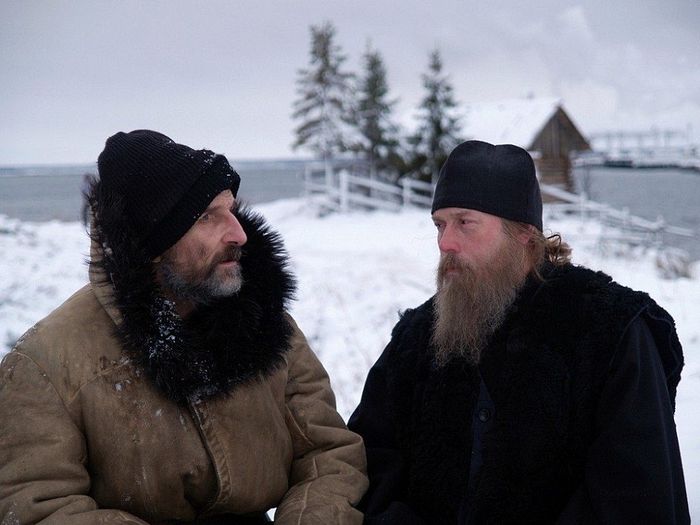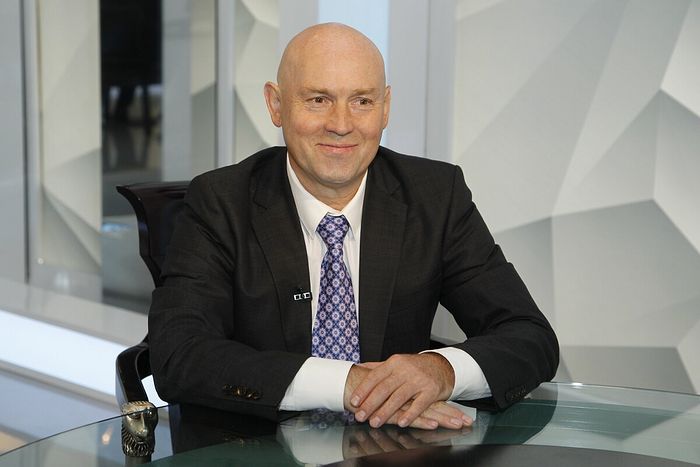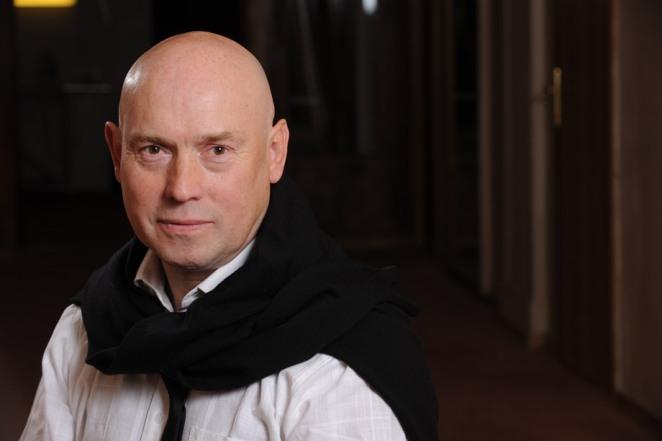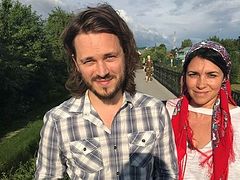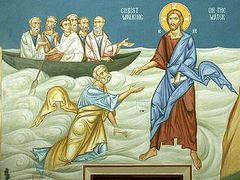From the interviewer: We’re already used to deep sayings from Viktor Sukhorukov about God, about the most difficult moments in life. It’s no surprise that they’re coming from the lips of a theater and film actor—because he has proven that he is a smart, subtle, thinking actor; and because for many of us he is perhaps already merged forever with the image of the abbot of the monastery—Fr. Philaret—in the feature film “The Island.” This role brought him fame, and now it’s hard to imagine anyone else in it. Nevertheless, his position was in doubt, and he wasn’t immediately approved for the role.
Everything that happened to him then, on the set of the film, he considers a great happiness. And after meeting with Viktor and recording this conversation, I thought about how important it is to set foot on such an island, as in the film, at least once in life; to find it—through chance, profession, people… A sacred personal space, a pivot point for new periods in life. And another thing: Finding an island, you’ll see other islands around you. Many. One island will multiply in a series, horizons will part and touch that mysterious eternity. And on the site where the film was shot—on the shore of the White Sea—a wonderful landscape opens up: The path to the islands is a beautiful ridge stretching out to sea… With God there is a lot of everything, only, don’t be afraid to begin your journey.
In this interview, journalist and television and YouTube host Elena Kozenkova speaks with the People’s Artist of Russia Viktor Sukhorukov, beloved by Orthodox especially for his role as Abbot Philaret in “The Island.”
***
—Hello, Viktor! I propose that we conduct our interview a bit unusually. At the parish I go to on Sundays, people found out about this meeting and wrote some questions for you, saying: “Give these to our favorite actor from us.” I replied: “Why not?” Although I reserve my right to be the interviewer. Here are the questions from your fans, on the tray in front of you. The majority of them relate to “The Island.” Apparently this movie will be watched forever! Consider it as though you’re having a correspondence meeting with an audience that loves you and knows you first from “The Island.” Take a question…
—With pleasure. I’ll brag a little while I’m choosing one: I’m proud of Pavel Lungin’s film “The Island;” I’m proud, joyful, and grateful that I met Peter Mamonov, Pavel Lungin, and the whole team on the film. And the main thing is that before that, I never played such roles. Therefore, I regard the role of my Philaret, the abbot of the monastery, as Divine providence. It’s really providence, because even Pavel Lungin had serious doubts about me. He didn’t admit it. There were auditions. Later he called me and said: “We won! You were approved for the role of Philaret.” And of course, I really loved this role, this character. And I think we really created a unique spiritual story, for which we were given Patriarchal gramotas. Here’s mine, which I received from the hand of Patriarch Alexei II of Moscow and All Russia himself.
Alright, I have a question. Read it…
—You’ve basically already started answering this question… “Why did the director Pavel Lungin choose you for the role of the abbot of the monastery?”
—He saw something, discerned something in me. I don’t know. Although I really did stand in a line of many candidates. There have been many such cases in my life when I “selected” roles that belonged to others, that were prepared for others—for instance, the role of Emperor Paul in the film “Poor, Poor Paul”, which came out not long ago. The director Vitaly Melnikov approved me after a forty-five-minute conversation with him. Before that, he had others in mind—Konstantin Raikin and Igor Sklyar. But for some reason after our conversation, he took me. I’ve had a number of such cases.
Another example from one of my latest works is the film, “Orleans”, where I play a messenger-executioner who goes to people to awaken their conscience. I also “chose” this interesting role, because another actor simply couldn’t be in the film.
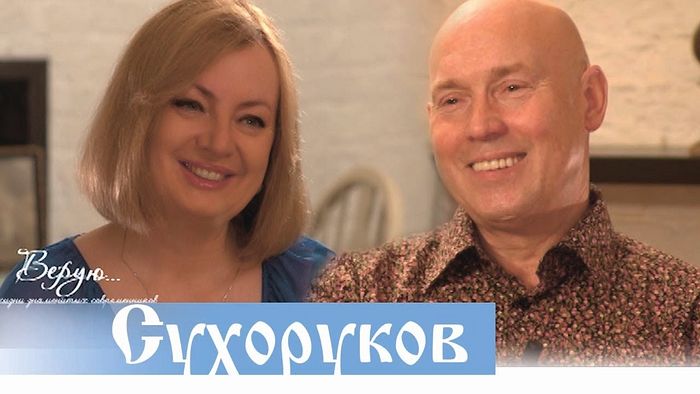 Elena Kozenkova and Viktor Sukhorukov
Elena Kozenkova and Viktor Sukhorukov
It all starts with the question “why?”
—Here’s an interesting one: “Have there been any times in your life when you rejected God or rebelled against Him?”
—There have been such cases. I’ll tell you about one (I really wasn’t expecting such a question). I’ll tell you a story I’ve never told anyone before. This is the first time I’m recalling it out loud; the city of Orekhovo-Zuevo, a three-room apartment, in the corner an old icon of the Mother of God, very old. We buried my mother. A difficult period began then. I was living in St. Petersburg, my brother was a soldier in Hungary, and my little sister was alone with our sick father. Something didn’t work out with her fiancé, difficulties with our father. She was a young girl. Everything was topsy-turvy. I went to Orekhovo-Zuevo and found her in a state of psychological shock. And there was nothing I could do to make this period easier for her. Then something else sad happened.
I was walking around the room where this icon was hanging. All of a sudden—I wasn’t prepared for this, there was no acting here—I turned to God’s corner and said: “Okay, take me. But why her? If You exist, why her?!” I walked out of the room angry, drunk without wine, aggressive. I resented Him, because I thought He was supposed to help, and she really needed help. And such outbursts of emotion—forgive me, Lord—there were so many of them.
—The next question you drew: “Who wrote such a profound screenplay for ‘The Island?’”
—It was a young guy—Dmitry Sobolev, an able student from Y. Arabov’s studio (the script department of the Gerasimov Institute of Cinematography). The screenplay was his thesis and was highly evaluated by specialists. The teacher himself worked for him to make the script come true. Many people refused to take it up.
—Was the script originally as we came to know it in the film?
—It was a little different. It didn’t have the main character—Fr. Anatoly, played by Peter Mamonov. The film has three heroes and three approaches to faith, to God: Fr. Anatoly, the stoker, Abbot Philaret, and the treasurer monk, played by Dyuzhev. Some rely on the material, others on the spiritual. That was added to the script when we were already on set.
A miracle on Pascha
—I’ll keep reading the questions from your audience. Most of them are about “The Island.”
—I regret that I didn’t have more roles like that.
—“Do you know any abbots at monasteries who you can go talk with, and if need be, stay at the monastery for a while?”
—Unfortunately, I don’t have any specific abbots like that. But I’ve received a huge number of invitations, beginning with my Orekhovo-Zuevo parish, where I’m from. We have a magnificent church; magnificent! It’s been preserved all this time with wonderful icons. I’ve been invited to stay on Mt. Athos too, at Solovki, Valaam. I’ve received many invitations.
—Which holy places do you love to visit?
—I don’t go on pilgrimages, because I travel so much. My life is largely on the road.
First of all is my Orekhovo-Zuevo church.
A miracle happened there, when I was a young Komsomol boy, standing near the fence at Pascha. The police weren’t letting any young people in. It was a Babylonian pandemonium; all the doors were wide open—the central entrance and the side doors. There was steam coming out of there, because it was the nighttime Paschal service. The church was full of people, and we young people were jostling around the church. I looked at the fence and said opportunistically: “If I wind up inside the church, I’ll go to theater school. If not—I won’t.” You won’t believe it; I don’t even know how I wound up in the church and stood there until four in the morning. That was the first miracle.
The second miracle was connected with the same church, when I returned home after serving in the army and got a job as an electrician. One beautiful day during the week, a feast day, we passed by our church. The door was wide open, as if beckoning to us, saying: “Come into my coolness.” Well, we stopped for a minute and went into the church.
I’ve lived my life, and this icon is still hanging in its place! St. Nicholas the Wonderworker with a church and a sword! I stopped and looked at it. He mesmerized me; he looked at me with some piercing, fearsome, severe eyes, as if he was asking something. I just didn’t understand what. Suddenly a woman’s voice came from behind: “Is it interesting?” “It is.” “Do you like it?” “I like it.” “What’s your name?” “Vitya.” “And what do you want?” “I want to become an actor.” And she launched into a monologue—that she would pray and that this icon would support me. I paid very serious attention to it. This was in May, and in June I was accepted to the school, to study acting. Maybe it wasn’t a miracle, but a coincidence? But I have defined them as miracles for myself.
And the second place, of course, which I visited recently—a few years ago—is Jerusalem, including the Church of the Holy Sepulcher and all the legendary places connected with Jesus Christ: the carrying of the Cross, the road to Golgotha—all of it.
—Did you go on this path in Old Jerusalem?
—I walked the whole thing! I went everywhere! I go back there all the time and walk the old paths and find new things. I believe in it so much that I’m shaking. And most importantly, I feel like I belong there. You can believe it or not…
—Again about “The Island:” “Viktor Ivanovich, your character in the film ‘The Island’ is concerned about certain items. What place does the material sphere have in your life? Are there any things you’re bound by?”
—I have a lot of stuff, but I’m not tied to it. Moreover, every year I conduct an audit. If I didn’t use it much, I rid myself of it however I can: I throw it away, I give it away, I take it to the theater, I take it to my dacha, and so on.
—“What does repentance mean for you? Have you ever had tears of repentance?”
—Fairly often. Of course. Tears of repentance, or repentance in general is like a bath, only, not physical. There is a kind of purification. I’m not shy about this.
“I want to be needed”
—Next question: “Did your work on the role of Abbot Philaret have an affect on your inner world, on your life?”
—Of course this role affected my life. I received a number of prizes and recognition. Of course, I discovered a new Sukhorukov thanks to Philaret, because I never acted so calmly, peacefully, contemplatively, and shyly before.
—By the way, the Patriarch and various priests said that you did the best job playing the role of a priest.
—Surprisingly, I didn’t have any prototypes. I didn’t consult with anyone. But this role taught me to peer into a man, to listen, to delve into a man.
Maybe it sounds strange, but this is the first time I tried to talk to a person, loving him. It’s hard. Moreover, Mamonov—he’s a complex figure, contradictory, nebulous. And yet, was there an immersion? There was. Was there any belief that someone was helping us or something was present around us? Of course. And in this case, even now I see, when they show this film sometimes—unfortunately, less often than it should be shown—that it has very serious themes: repentance, modesty, human torment. And what is human torment? It is the ablution of the soul.
—Torment is also a premonition of hell, I think…
—That’s fear. The premonition of hell is fear. But shame cleanses a man. I think our film has a conversation about shame, which is very important for a man.
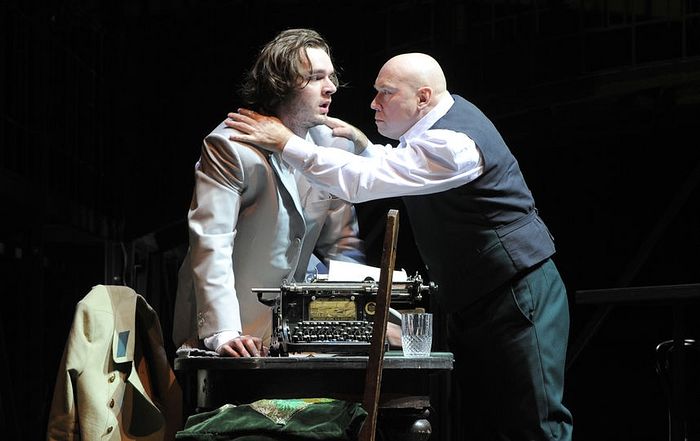 In a production of Crime and Punishment
In a production of Crime and Punishment
—It’s a picture about repentance—perhaps the only film in modern cinema where there is such a deep conversation about repentance and about the changes in a man, about transfiguration.
Your repertoire includes a role in a theatrical production based on Dostoyevsky’s Crime and Punishment. This work could continue our conversation on this topic.
—I’ll tell you. It’s called RRR, where I play Porfiry Petrovich. We even have a curious resolution. If you play Porfiry Petrovich the usual way, the investigator who’s looking for a criminal who killed an old woman, then you play it like a man who is Jesuitically trying to expose and punish Raskolnikov. But my Porfiry Petrovich, as it were, feels ahead of time, understands, then knows who killed. But he doesn’t run, doesn’t follow him, Rodion Raskolnikov, to punish him—he goes to save the rest of his life. We build it up so that yes, he’s to blame—“But still, you’re not a complete scoundrel. I believe in you. There’s a lot more to come!”—my investigator says to Raskolnikov. “What will come?” Raskolnikov shouts. “Life! You have your whole life ahead of you! Turn yourself in.”
My Porfiry Petrovich wants to save the rest of his life, whether that’s five, twenty, or a hundred years. Okay, you committed a crime—answer for it. But then—go on, continue to live! Because you have to love life more than its meaning. This is our resolution. “And I, Porfiry Petrovich, decided not just to catch a criminal, but to save him. To do that, you have to make a confession. It will significantly mitigate your punishment. It’s true you did something despicable. But still, you’re not a hopeless scoundrel. I believe that there is much more to come for you!... Turn yourself in.”
I’ll add to that. I had an even more interesting role—Tsar Feodor Ioannovich in the play, “The Kingdom of the Father and the Son”, based on the Tolstoy play. When I was working on the role of Feodor Ioannovich, I naturally immersed myself in the materials of the time. This was just before the Time of Troubles. As soon as Tsar Feodor dies, there’s Godunov, Shuisky, and the whole mess starts. The Great Turmoil begins. Terrible times—I don’t know how they survived. It’s a scorched earth. When scholars told me, “It was timelessness, these twelve years—it’s as if they never were. Tsar Feodor was sick…” But Feodor Ioannovich wasn’t sick, as they tell us. He was, of course, a little not of this world. He was such a true believer that his bedroom was covered with icons. He slept among burning candles. You know? His whole bedroom was full of smoke. He built so many churches during his twelve years of rule that when he died, the people who saw him off wept so much that you couldn’t hear the church choir.
—How nice that you’ve been given such roles!
—Well, the plate with questions is empty. Do you know how I’ll end this long conversation? With what thought?
I don’t begrudge myself to others anymore. I suddenly wanted to work for their sake now. I suddenly remembered a good old film with Cherkasov. I love this phrase: “Everything is left to the people.” How I want to be needed. It’s quite an interesting process—in my youth, I wanted to be liked, then I wanted to arouse interest, now I’m in the third stage—to be useful. Today, oddly enough, this stage is internal, in the internal organism—I don’t want to be a stranger here. When I depart, I want people to remember me as one of their own. It’s amazing!
—You’re about to turn sixty-five. I read one interview where you said something amazing: “I know how to enjoy life.”
—You know, the flesh grows old, but the soul, the conscience, and faith remain vigorous, strong, and unwilling to give up.
—What questions does Viktor Sukhorukov contemplate at this frontier?
—I’m afraid of fatigue, I’m afraid of exhaustion, I’m afraid of being suddenly disconnected from life. I mean if my head will still understand that I have something to do, but my hands and feet won’t allow it anymore—the fear of infirmity. I really don’t want to be infirm. I want to go quickly.
Today, when they’re proving that we came from water and some other substances, I always ask myself: “So why do we fly in our dreams? Where does such a program within a man come from?” But I’m sure it’s God’s program, that He’s always telling us: You’re not capable of flying in life—but in a dream, well, go ahead! And we fly! It makes us feel great, and scared, and joyful. But we fly in dreams. And they tell me that man comes from water!
—I wish you new creative flights, and not only in dreams! And thank you for your answers to my questions and the questions from parishioners of the Church of the Smolensk Icon of the Mother of God in the Moscow suburbs.

